HEC students, actors of the energy transition in France
A delegation of 10 students from HEC Paris submitted their recommendations for the future French energy mix to the Ministers of Energy Transition and Higher Education and Research on Monday 6 March 2023, as part of the national consultation "Our energy future is decided now". This contribution is in line with the school's commitment to eco-responsibility, as well as that of our students and graduates.
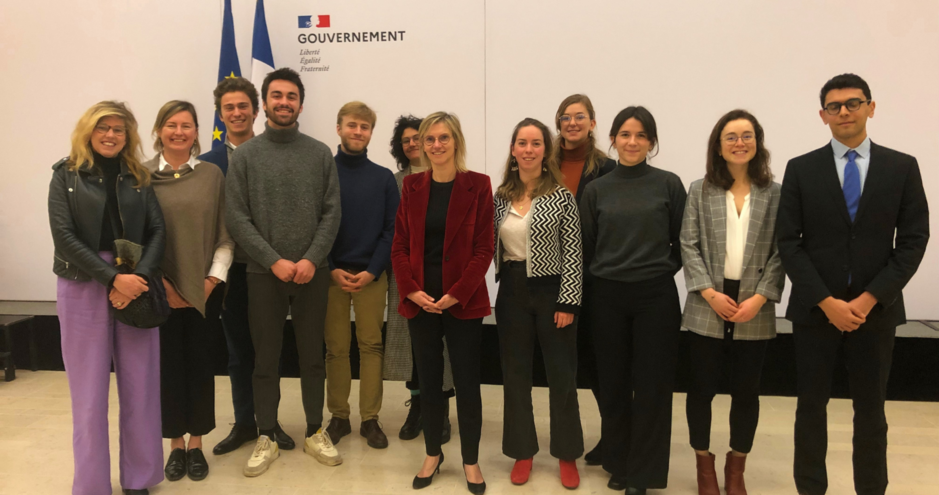
Auteur/Author of this article: Frédéric Voirin
"The quality of public decision-making improves when all interested parties can make their views heard." This is the "loobying For Good" approach, as conceptualised and carried by Alberto Alemanno, Professor of Law at HEC, founder of the NGO 'The Good Lobby', and in which the HEC students were totally involved on this 6 March at the Hôtel de Roquelaure, of the Ministry of Ecological Transition
After particularly committed speeches at the HEC 2022 graduation ceremony, then the presentation of a White Paper on biodiversity to members of the government, ahead of the COP15 negotiations, and a remarkable speech before an audience of business leaders in favour of a "radical transformation of the system" at the 9th economy summit, HEC students and graduates are continuing their advocacy of the transition with political decision-makers and public opinion.
At the beginning of 2023, 10 Master students, members of the Esp'R association and the HEC Transition club (Shedy GUIGA, Valentine JAPIOT, Helena MATIVAT, Shiraz MORET-BAILLY, Claire LE BESCOND, Zoe BANTIGNIES, Eliette VERDIER, Pierre TARDY, Joseph NAULLEAU, Max
PERNATON) who submitted a 25-page note, a contribution to the national consultation on the energy mix, to two ministers, Agnès Pannier-Runacher, Minister for Energy Transition and Sylvie Retailleau, Minister for Higher Education and Research. They were accompanied by several members of the HEC Paris management, including Joséphine Haquet, Director of Communications, Marguerite Gallant, Executive Director of HEC Alumni and Magdalena Rawecka, Project Manager - Sustainability in the HEC Transition Department.
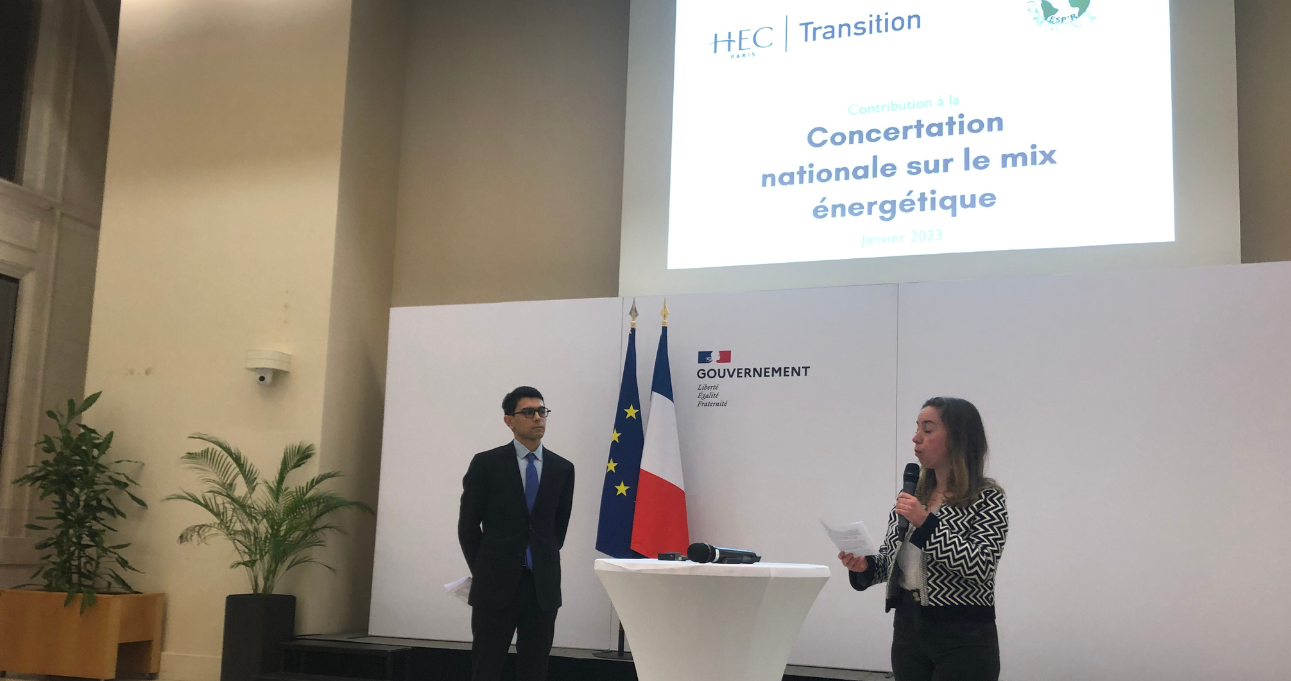
"You are the ones who will lead this energy transition!
Alongside other students from higher education establishments such as Dauphine-PSL, Sciences Po Paris, IPAG, Université Bretagne Sud and the University of Poitiers, HEC students worked for a month on this fundamental project to propose concrete solutions for the energy transition.
We wanted to give a specific place to young people in this consultation because it is you who will have to implement the changes (Agnès Pannier-Runacher, Minister for Ecological Transition)
Sylvie Retailleau recalled the importance of youth involvement by underlining the key role of knowledge as a prerequisite for this involvement, and the need to think in an interdisciplinary and systemic way.
This is why, from the start of the 2025 academic year, all students will be made aware of the challenges of ecological and energy transition. The student population will thus be able to receive more training in these new professions of the future, with a particular emphasis on the feminisation of industrial and technical fields. Similarly, all higher education establishments will have to draw up a master plan to move towards a more ecological transition.
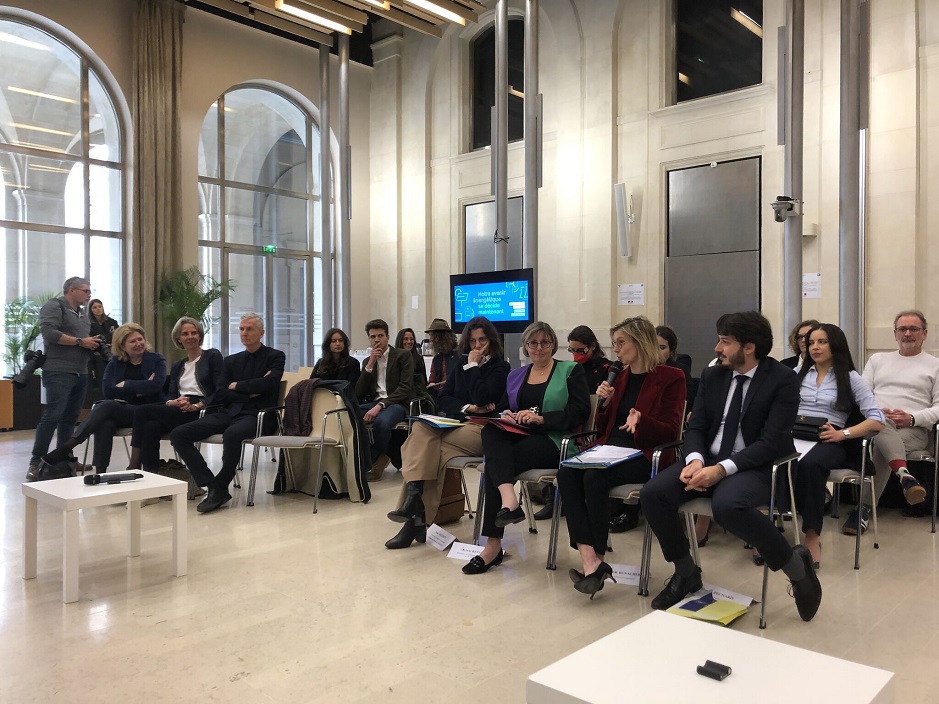
"Our schools must be at the forefront of the ecological transition and not at the end of the chain".
The students, for their part, drew up a statement of urgency while stressing the responsibility of a school like HEC:
The more time passes, the more the field of possibilities narrows. Today we need a vision and a direction. Our schools must be at the forefront of the transition. This five-year period must be the pivot.
Despite this seriousness, it is also optimism that emerges from their report. We have all the keys in hand to implement the transition. (...) We hope that this consultation will make 2023 the year of action, with strong, assertive and transparent choices, to guarantee its sustainability during the next five years.
15 recommendations for designing our future energy system
These 15 recommendations are structured around three axes: adapting consumption, the energy mix, and implementing the energy transition, and are all answers to three decisive questions posed during the consultation:
How can we adapt our consumption to achieve the objective of carbon neutrality?
How can we meet our electricity needs, and more generally our energy needs, while ensuring that we are no longer dependent on fossil fuels?
How can we plan, implement and finance the energy transition?
We are not experts, but the prestige of our school allows us to get our message across (Zoë Bantignies-Le Bars (M.23), co-editor of the report)
During their presentation, the students were keen to emphasise the three issues that cut across their proposals, starting with the need to take account of global limits when defining the future energy mix.
To be desirable and viable, we consider that the energy mix must be sustainable, socially just and resilient.
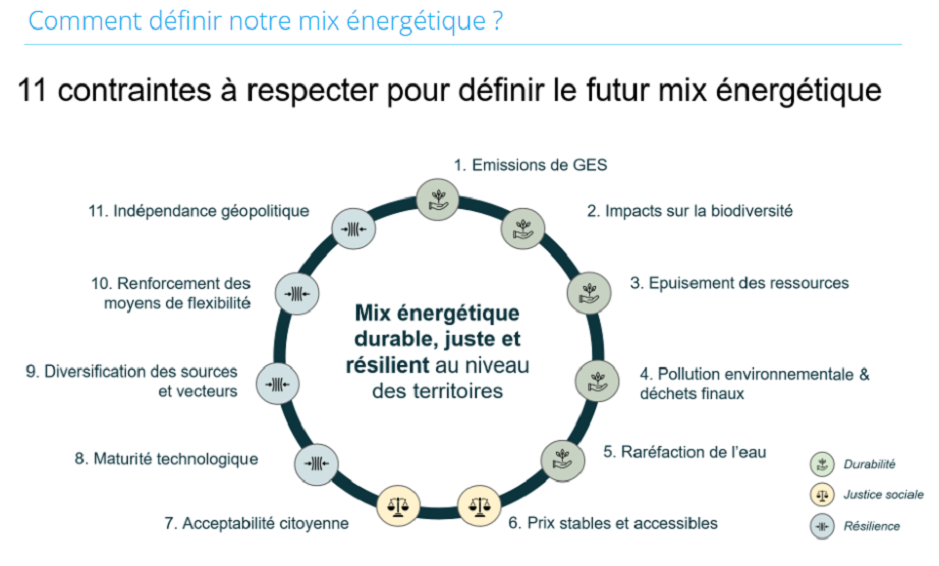
The second issue is that of social justice: "The definition of the energy mix must pursue an objective of accessibility and, above all, price stability, which could be supplemented by specific measures to support households affected by fuel poverty.
Finally, they insisted on the importance of higher education in order to "train the skills of the transition", to open new fields and to support research.
Aware of the obstacles that stand in the way of the energy transition, they also drew the attention of the two ministers to 4 challenges:
1. Getting out of the sterile opposition between renewable energy sources and nuclear energy, which paralyses the public debate
2. Accelerating the transition from demand to supply
3. Find a transparent consensus with all political parties in order to safeguard the energy guidelines
4. Rebuild our energy and materials sovereignty
The list of recommendations of the HEC Students for a better energy transition is available in this online report (in french):
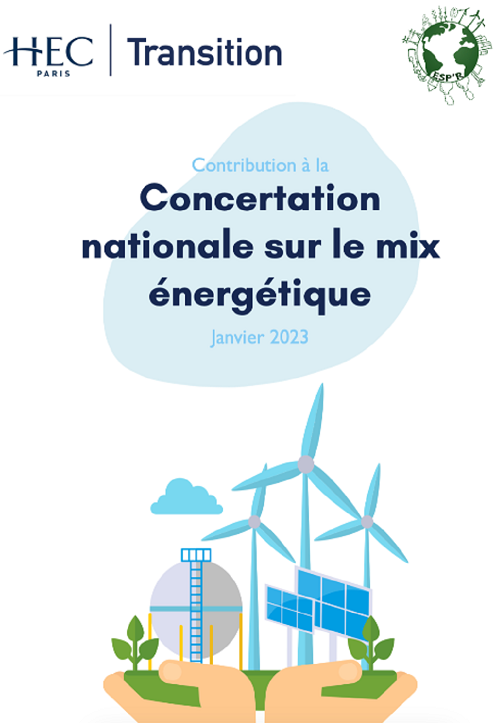
Making France the first great decarbonised industrial nation
Like her colleague from Higher Education and Research, the Minister for Energy Transition, Agnès Pannier-Runacher, emphasised the quality of the HEC students' proposals.
She recalled the course set by the government to make France the first major industrial nation to exit the carbon economy.
?️ Ils sont une soixantaine d’étudiants venus débattre aujourd’hui au ministère des conditions de réussite de notre #TransitionÉnergétique et des mesures prioritaires à mettre en œuvre. Leurs travaux nourriront la concertation sur le mix énergétique. @sretailleau pic.twitter.com/JlFpmnVpAY
— Agnès Pannier-Runacher ???? (@AgnesRunacher) March 6, 2023
To achieve this objective, the recruitment of experts within the public administration is crucial. The minister does not hide the fact that she has come to recruit, insisting on the difficulties of finding profiles to manage files related to renewable energy. "We are looking for talent. If you have CVs, don't hesitate to submit them," she concluded with a smile. 100,000 jobs will have to be created to achieve the objectives of the transition. Interested parties are advised!
Thanks to this student contribution to strategic and operational thinking in favour of the energy transition, HEC Paris is continuing its work of influence by proposing avenues of reflection and concrete solutions to the climate and energy crisis for the common good. A true professional and virtuous ecosystem is still to be built and our school intends to participate more and more actively.